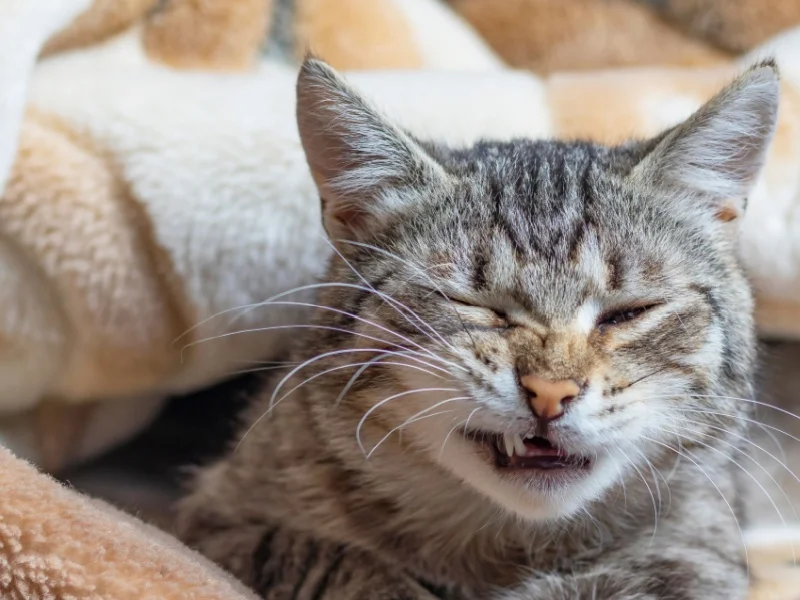Have you ever caught your feline friend exhibiting an unusual, sudden movement of their head? It’s a common phenomenon, often dismissed as mere cat-ness, but what if I told you that this twitching could be more than just a quirk?
Cat Head Twitching Symptoms: Understanding the Causes and Effects
As any cat owner will attest, observing your pet’s behavior can be an endless fascination. However, when we notice our feline friends exhibiting unusual movements or behaviors, it’s natural to feel concerned. Cat head twitching is one such phenomenon that has left many owners puzzled and wondering: what causes this sudden jerking of the head?
The Importance of Understanding Cat Head Twitching
In this blog post, we’ll delve into the world of cat behavior and explore the underlying reasons behind this fascinating feline phenomenon. We’ll examine the various possible causes of cat head twitching, from neurological issues to behavioral cues, and discuss how understanding these symptoms can help you better care for your beloved pet.
Common Causes of Cat Head Twitching
One of the most common causes of cat head twitching is neurological disorders. Feline hyperesthesia syndrome (FHS) is a condition characterized by an increased sensitivity to touch or certain stimuli, which can cause sudden jerking movements of the head and other body parts.
This condition can be caused by various factors, including genetics, injuries, or environmental triggers. As a responsible cat owner, it’s essential to recognize the signs of FHS and take steps to provide your pet with a comfortable and safe environment.

As we explored earlier, cat head twitching is a common phenomenon that can be caused by various factors, including neurological disorders. Let’s dive deeper into the world of feline behavior and examine some other possible causes of this sudden movement.
Common Causes of Cat Head Twitching (continued)
Sleep-related behaviors are another potential cause of cat head twitching. Cats, just like humans, experience REM sleep cycles, during which they can exhibit unusual movements, including twitching or jerking of the head and limbs.
This type of twitching is usually harmless and may be a sign that your feline friend is simply having a vivid dream. However, if you notice other unusual behaviors, such as rapid breathing, whimpering, or thrashing, it’s always a good idea to consult with your veterinarian to rule out any underlying medical issues.
Another possible cause of cat head twitching is anxiety or stress. Cats can pick up on their owner’s emotions and react accordingly, which may manifest as sudden movements or behaviors. For example, if you’re feeling anxious about an upcoming event or change in routine, your cat may sense this energy and exhibit similar behaviors.
It’s essential to recognize the signs of anxiety in cats, such as pacing, panting, or hiding, and take steps to provide a calm and comforting environment. This might involve reducing stress-inducing stimuli, providing plenty of playtime and attention, or even using calming aids like pheromone diffusers or calming music.
What Can You Do About Cat Head Twitching?
While cat head twitching can be a concerning phenomenon, there are steps you can take to address the underlying causes. By understanding what might be driving this behavior, you can work to create a more comfortable and stimulating environment for your feline friend.
For example, if you suspect that your cat’s twitching is related to anxiety or stress, you can try providing more mental stimulation through puzzle toys or interactive play. You can also work on reducing your own stress levels by practicing relaxation techniques like meditation or deep breathing.
Remember, every cat is unique, and what works for one feline may not work for another. If you’re concerned about your cat’s twitching or overall behavior, it’s always a good idea to consult with a veterinarian or certified animal behaviorist for personalized guidance and support.
Learn more about feline behavior and anxietyStay tuned for our next installment, where we’ll explore the importance of providing a stimulating environment for your cat and how this can impact their overall health and well-being.
Get Expert Guidance on Cat Head Twitching Symptoms
We are ready to answer your questions, day or night.
Start chatIn our previous sections, we explored the fascinating phenomenon of cat head twitching, delving into its possible causes and effects. From neurological disorders to behavioral cues, we’ve covered a range of potential explanations for this sudden jerking movement.
Key Points Summarized
To recap, some of the key points covered in our discussion on cat head twitching include:
- Feline hyperesthesia syndrome (FHS) is a common cause of cat head twitching, characterized by increased sensitivity to touch or certain stimuli.
- Other possible causes of cat head twitching include neurological disorders, such as epilepsy or stroke, as well as behavioral cues like anxiety or stress.
- As a responsible cat owner, it’s essential to recognize the signs of FHS and take steps to provide your pet with a comfortable and safe environment.
Final Insights
In conclusion, understanding the causes and effects of cat head twitching is crucial for providing the best possible care for your feline friend. By recognizing the signs and symptoms of this phenomenon, you can take steps to address any underlying issues and ensure your pet remains happy and healthy.
A Final Thought
As we wrap up our exploration of cat head twitching, remember that every twitch, flicker, or quiver is a unique window into the fascinating world of feline behavior. By embracing this curiosity and staying attuned to your pet’s needs, you can build a stronger bond with your feline companion and enjoy a lifetime of joy, companionship, and wonder.
Frequent Urination: A Warning Sign of High Blood Sugar: If you’re experiencing frequent trips to the bathroom, it may not just be a sign of a busy day ahead! Learn how this common symptom can signal a more serious issue with your blood sugar levels. Stay informed and take control of your health!
What are Bumps on Jaw in Back of Mouth?: Have you ever noticed lumpy growths on the back of your jaw? Don’t let these mysterious bumps go unchecked! Discover what they might be and how to get them checked out. Take control of your oral health today!



